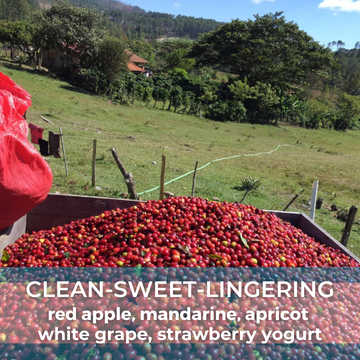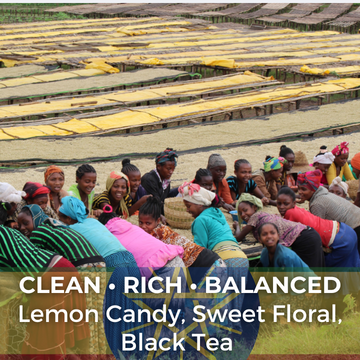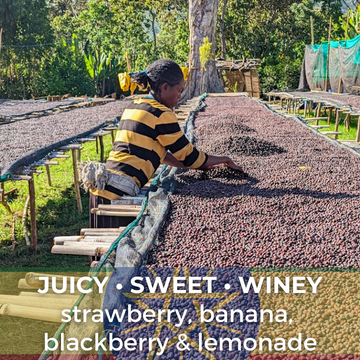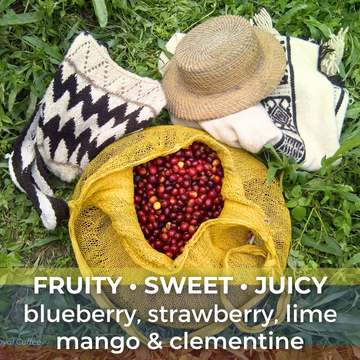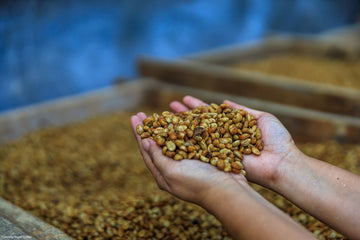Timor-Leste Ermera Lebudu Kraik Organic
This Farmgate coffee is one of two fine selections from the Ducurai village of Timor-Leste (also known as East Timor) that we've chosen from this season's harvest. At it's best, East Timorese coffee is like a blend of Indonesian coffee and Central American coffee. It's rich, warm and velvety yet balanced and clean. This particular offering is like a dark chocolate brownie mixed with candied blood orange. Absolutely decadent!
Coffee from Timor-Leste, also known as East Timor, can be tough to get your hands on. The small nation in the South Pacific islands produces very little coffee in comparison to its neighbor, Indonesia. That makes our two farmgate offerings from Ermera all the more special! What does farmgate mean anyway? To be perfectly honest, this can be one of those words that gets kinda tossed around loosely to help market coffee as well as anything else that comes directly from a farm like produce. The actual definition of farmgate means that the farmer and exporter negotiate a fair price right at the farmer’s gate. But since that’s not possible in some of the extremely remote areas of the world where our favorite coffees are grown, “farmgate” has evolved into a concept that simple revolves around extreme transparency. You can follow the journey of this coffee all the way back to the farmer and rest easy in the knowledge that that farmer received a fair price and living wage for all of their love and hard work. Of course, this more expanded meaning of farmgate relies on trust, it can’t just be a label slapped onto a package. This coffee’s importer, Royal Coffee, doesn’t toss around the word farmgate lightly, so check out the ”Farm Bio” section and read all about the story of this coffee and it’s journey to you!
Most coffee from Oceania and the Indonesian archipelago is wet-hulled, which is a traditional semi-washed method of coffee processing. Coffee from Timor-Leste, however, is fully washed resulting in a much cleaner and sweeter cup than its neighbors while still maintaining the syrupy body and some of the mild acidity Indonesian coffee is known for. It's kind of like blending an Indonesian coffee with a fully washed Central American coffee. Both our offerings from Ermera fit this description to a “T”! This particular coffee is absolutely decadent. I’m talking fudge brownie level decadent. Top that with ripe blood orange, a little baking spice and just a dab of key lime. You might wanna think twice before adding sugar to this cup, you might think you’re drinking desert!
Reminder! This coffee is raw, you must roast it before brewing
Arrival Date: April 7, 2023. US Arrival: March 2023, Packed in GrainPro
Acidity & Brightness: Mild acidity and decadently sweet
Balance & Finish: Good balance with a pleasant lingering finish
Body & Texture: Rich body and velvety texture
Flavors: Blood orange, brown sugar, dark chocolate and a touch of key lime
Grade: Very hard and dense, grown at 1250 - 1450 masl
Processing: Fully washed and dried on raised beds
Certifications: Organic
Grower: 10 smallholder farmers organized around Café Brisa Serena
Region: Ducurai Village, Letefoho Sub-District, Ermera Municipality
Varieties: Typica and Timor Hybrid
Recommended Roast Range: City+ to Full City+ (light-medium to medium-dark)
Since this coffee is fully washed, we prefer it in the Light-Medium to Medium-dark range (City + to Full City+). Medium will likely strike the best balance for most roasters. If you prefer to bring out more citrus acidity, end the roast as 1st crack is trailing off. For more rounded sweetness and chocolate, roast until you hear the very first snap of 2nd crack.
Royal Coffee - “Timor-Leste, or East Timor, takes up the eastern half of the greater Timor island, part of the Indonesian archipelago and not far from the northern coast of Australia. It is a young republic with a long and chaotic political history, having only achieved full independence in 2002, after almost 500 years of consecutive occupations by the Portuguese, the Dutch, and Indonesia.
Timor-Leste’s coffee is small in overall scale but highly significant to the Timorese, 25% of whom rely on coffee production for their livelihood. The island’s inland forests also happen to be historically significant, being the origin of coffee’s most adaptive genetic cross—the Timor Hybrid—a natural breeding of local robusta and typica trees that was identified in the 1920s, and whose vigorous genetics can be found in countless timor-based cultivars in almost every producing country today. The island’s isolation has also allowed for a unique preservation of endemic typica variety coffees, whose purity and diversity resembles that of nearby Papua New Guinea, and expresses similarly in the cup.
The greater Timor Island is sunbaked and humid along its coast, but the interior quickly rises to lush and rugged highlands, with sharp ridges and vibrant grass-covered slopes. The Ermera municipality is one of the island’s highest in elevation and includes its highest peak, Tatamailau. The villages in the mountain’s vicinity are where Café Brisa Serena (CBS), a social enterprise and exporter, has spent the last 10 years developing smallholder coffee value chains.
This coffee is produced by 10 select farmers from the Ducurai village, whose group is called “Lebudu Kraik”, which translates to “lower wetlands” and comes from their particular location on the mountainside. The Ducurai village is just north of Tatamailau’s peak and Lebudu Kraik is one group in a small portfolio we import each year from CBS, who began by training remote smallholders in farm management and processing, and who is now a highly capable exporter with some of the best smallholder traceability in the world. Each year we receive a spreadsheet with farmer names and farm data, as well as parchment prices paid. This harvest Lebudu Kraik group farmers received $3.25 per kilogram of dried parchment, which after final dry milling is roughly equivalent to $2.11 per pound of exportable green coffee.
Coffee in Letefoho is not young. Trees are tended to for decades, and due to the lofty, vine-like typica varieties throughout, coffee is often harvested by leaning long wooden ramps against the trunk so that pickers can access the sprawling canopy. Farms range between 0.5 and 1.5 hectares only and tend to be well-shaded by evergreen she-oaks, a natural mulcher and nitrogen fixer. During harvest coffee is picked painstakingly by hand and processed at home on personal or shared pulping equipment, which is often hand-made using wood and textured metal discs.
After fermenting in small personal containers, the coffee is dried on raised beds and constantly sorted for quality. Many of the current harvesting and processing standards come directly from CBS, who has helped establish specialty protocols and invested in improvements to processing equipment. The addition of drying structures, for example, has greatly improved farmers’ ability to consistently meet quality standards for moisture content and water activity. In addition to coffee, Ducurai farmers also manage personal crops of taro and cassava, as well as pigs, goats, fowl, and cows, and many also have personal compost programs in addition to being organic certified.
Café Brisa Serena works with over 400 farmers in the Letefoho area. The organization was formed in close collaboration with Peace Winds Japan, a Japanese NGO that had been working in Timor-Leste’s coffee lands during the first decade after independence, when violence and crumbled infrastructure had disenfranchised many remote coffee communities. CBS continued the development work of Peace Winds, and in 2015 began a formalized specialty export chain. CBS also runs a café in Dili, the nation’s capital, where it promotes Letefoho’s specialty coffee to locals.
For more on CBS and Peace Winds Japan, see Evan Gilman’s interview with Armando de Araujo of CBS, here: https://royalcoffee.com/producer-interview-armando-de-araujo-from-cafe-brisa-serena-timor-leste/”
